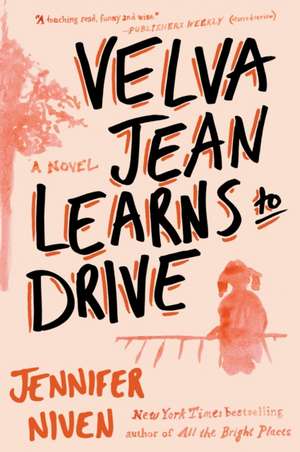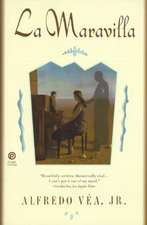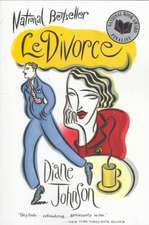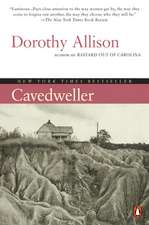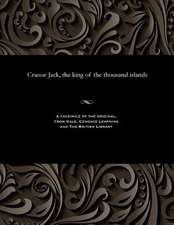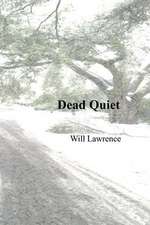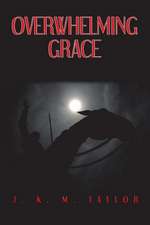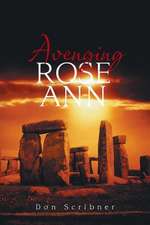Velva Jean Learns to Drive
Autor Jennifer Nivenen Limba Engleză Paperback – 30 iun 2009 – vârsta de la 18 ani
In this spellbinding debut, Velva Jean Hart finds true love-and then risks everything to follow her dreams
Set in Appalachia in the years before World War II, Velva Jean Learns to Drive is a poignant story of a spirited young girl growing up in the gold- mining and moonshining South.
Before she dies, Velva Jean's mother urges her to "live out there in the great wide world". Velva Jean dreams of becoming a big-time singer in Nashville until she falls in love with Harley Bright, a handsome juvenile delinquent turned revival preacher. As their tumultuous love story unfolds, Velva Jean must choose between keeping her hard-won home and pursuing her dream of singing in the Grand Ole Opry.
Set in Appalachia in the years before World War II, Velva Jean Learns to Drive is a poignant story of a spirited young girl growing up in the gold- mining and moonshining South.
Before she dies, Velva Jean's mother urges her to "live out there in the great wide world". Velva Jean dreams of becoming a big-time singer in Nashville until she falls in love with Harley Bright, a handsome juvenile delinquent turned revival preacher. As their tumultuous love story unfolds, Velva Jean must choose between keeping her hard-won home and pursuing her dream of singing in the Grand Ole Opry.
Preț: 127.41 lei
Nou
Puncte Express: 191
Preț estimativ în valută:
24.38€ • 25.52$ • 20.17£
24.38€ • 25.52$ • 20.17£
Carte disponibilă
Livrare economică 15-29 martie
Preluare comenzi: 021 569.72.76
Specificații
ISBN-13: 9780452289451
ISBN-10: 0452289459
Pagini: 404
Dimensiuni: 133 x 206 x 23 mm
Greutate: 0.35 kg
Editura: Plume Books
ISBN-10: 0452289459
Pagini: 404
Dimensiuni: 133 x 206 x 23 mm
Greutate: 0.35 kg
Editura: Plume Books
Recenzii
"Niven creates a world long gone, a mountain past where people suffer failure, loss, and betrayal, as well as the strength and joy of connection and deep love. Velva Jean Learns to Drive takes us far into this soaring, emotional country, the place where our best music comes from."
-Robert Morgan, author of Gap Creek
"Velva Jean learns to . . . not only drive, but to soar. This beautifully written coming- of-age story captivated me, and I recommend it to anyone who has ever longed to 'live out there.'"
-Ann B. Ross, author of the bestselling Miss Julia novels
"It's a touching read, funny and wise, like a crazy blend of Loretta Lynn, Dolly Parton, a less morose Flannery O'Connor and maybe a shot of Hank Williams."
-Publishers Weekly (Starred Review)
"Jennifer Niven brings pre-World War II Appalachia to life in her spirited new novel..."
-The Costco Connection
"Velva Jean...feels very much like a homecoming."
-Star-News
"...it is not hard to enjoy the romance of images like the one that opens the book: a little girl, pondering questions of salvation, tucked up in bed under the tin roof of a narrow house, with the 'high, lonesome cry' of a panther in the background."
-Christian Science Monitor
-Robert Morgan, author of Gap Creek
"Velva Jean learns to . . . not only drive, but to soar. This beautifully written coming- of-age story captivated me, and I recommend it to anyone who has ever longed to 'live out there.'"
-Ann B. Ross, author of the bestselling Miss Julia novels
"It's a touching read, funny and wise, like a crazy blend of Loretta Lynn, Dolly Parton, a less morose Flannery O'Connor and maybe a shot of Hank Williams."
-Publishers Weekly (Starred Review)
"Jennifer Niven brings pre-World War II Appalachia to life in her spirited new novel..."
-The Costco Connection
"Velva Jean...feels very much like a homecoming."
-Star-News
"...it is not hard to enjoy the romance of images like the one that opens the book: a little girl, pondering questions of salvation, tucked up in bed under the tin roof of a narrow house, with the 'high, lonesome cry' of a panther in the background."
-Christian Science Monitor
Notă biografică
JENNIFER NIVEN’s first book, The Ice Master, was named one of the top ten nonfiction books of the year by Entertainment Weekly. Her second book, Ada Blackjack, was a Book Sense Top Ten Pick. She splits her time between Atlanta and Los Angeles.
Extras
One
I was ten years old when I was saved for the first time. Even though Jesus himself never had much to do with religion before he was twelve, I had prayed and prayed to be saved so that I wouldn’t go to hell. Mama had never mentioned hell to me, but the summer after my tenth birthday, on the night before the yearly Three Gum Revival and Camp Meeting, my daddy told me that I might have to go there. He said that’s where sinners went, and that everyone was a sinner until they were saved.
“Have I been saved?” I asked him.
“No, Velva Jean.” He was polishing the handheld pickax he some— times used for gold mining. The front door was open and a faint breeze blew in off the mountain. It was still hot, even at ten thirty at night. Somewhere, far away, there was the high, lonesome cry of a panther.
“Why not?”
“I don’t know. Maybe you ain’t opened yourself up to the Spirit.” Daddy’s face was quiet and blank so I couldn’t read it. His one good eye— the one that wasn’t blind— wasn’t dancing like it normally did. It was always hard to know if he was mocking or serious on the subject of religion.
“How do you know I ain’t saved?” I asked a lot of questions, some— thing my daddy never had much patience for, especially in the heat.
“Because you’d know it if you was.”
I thought about this, trying to remember a time when I might have been saved without knowing it. I couldn’t think of one and suddenly this worried me. “What happens if I don’t get saved?”
“It means that you’re ‘astray like a lost sheep,’ and that after you die you’re going straight to hell.” Daddy laughed. “That’s why your mama and me prays every night for our children.”
For a moment, I couldn’t speak. What did he mean, I was going to die? What did he mean, I was going to hell? I didn’t want to go to hell. Hell was for the convicts down at the prison in Butcher Gap or the murderer who lived on top of Devil’s Courthouse. Hell wasn’t for decent people. I was sure my mama wasn’t going to be there or Daddy Hoyt or Granny or my sister, Sweet Fern, or Ruby Poole or Aunt Bird or Uncle Turk or Aunt Zona and the twins. Probably my brothers, Linc and Beachard, weren’t going to hell either, but I wondered about my youngest brother, Johnny Clay. And then I began to cry.
Later that night, when me and Johnny Clay were lying in our beds pretending to sleep, I whispered, “If you was to die, would you go to hell?” I had shared a room with Sweet Fern until she got married, and then Johnny Clay moved in with me.
There was silence from his bed and for a moment I thought he might actually be sleeping. Then he said, “I guess.”
I sat straight up and looked at him, trying to catch his face in the darkness to see if he was fooling or not. He rolled over and propped himself up with one arm. “Why you want to know about hell, Velva Jean?”
“Daddy says if we ain’t saved, that’s where we’re going because we’re all sinners till we been born again.”
Johnny Clay seemed to consider this. “I guess,” he said again.
“I’m going to get myself saved,” I said, “if it’s the very last thing I do. I ain’t going to hell.”
“Even if I’m there?”
“It ain’t funny, Johnny Clay. I’m answering the altar call at camp meeting and I’m going to pray and pray for Jesus to save me.”
“You don’t even know how to pray, Velva Jean.” Johnny Clay was smart. He was twelve years old and he knew everything about every— thing. He’d been an expert gold panner since he was nine, he’d been driving since he was ten, and at school he was the marble champion three years running. He was also the bravest person I knew. I just worshipped him.
“I know, but I’m going to start praying anyway. I’m going to start doing it right now.” And I got out of my bed and kneeled down beside it and closed my eyes tight. I tried to remember how Mama always began. There was a sigh and a rustling from Johnny Clay’s bed, and then he was beside me on the floor, hands clasped.
“Okay, Lord,” he said. “Please be merciful on us sinners. Please don’t let us die anytime soon. And if we do, please don’t send me and Velva Jean to hell. We just can’t stand it if we die and go to hell.”
“Amen,” I whispered.
~
The first day of camp meeting I could barely sit still. “Stop fidgeting,” Sweet Fern hissed at me across Beachard and Johnny Clay. Sweet Fern couldn’t stand for people to fidget, most particularly me, her own sister. She said it wasn’t something that ladies did, even though she knew I wasn’t one bit interested in being a lady. Still, I decided it wasn’t a good idea to talk back while I was on the path to salvation, so I sat on my hands to keep from picking at my nails and my dress. Johnny Clay kept poking me in the leg, trying to get me to thumb wrestle, but I stared straight ahead and waited for the altar call. Reverend Broomfield, the Baptist preacher, said he wanted only the backsliders—those who had been saved already and then lost their way. One by one, they went up to the altar and rededicated their lives to Jesus, and then everyone sang and Mrs. Broomfield announced the serving of the potluck supper.
On the second day, Reverend Broomfield said he wanted all the feuding neighbors to come forward so that he could talk to them about forgiveness and put them on speaking terms again, and afterward we all sang and Mrs. Broomfield announced the supper.
On the third day, Reverend Broomfield and Reverend Nix, who was the preacher at our church, asked for all the sinners who wanted to be saved. I sat straight up and paid attention. Reverend Broomfield promised salvation to anyone who needed it, and all you had to do was come up to the altar and kneel down and say that you loved and accepted Jesus and would live your life for him now and forever. I wondered what that meant exactly, if I could live my life for Jesus and still be a singer at the Grand Ole Opry, with an outfit made of satin and rhinestones and a pair of high-heeled boots. To sing at the Grand Ole Opry and wear an outfit made of rhinestones was my life’s dream.
One by one, I watched the other sinners take their places at the altar. I did not want to go to hell. But I did not want to give up my dreams either. I sat there, my toes pressed into the sawdust shavings, my legs tensed up, my hands gripping the edge of the bench. Even Jesus must like the Opry, I told myself, and I stood up.
No one in the congregation was supposed to look at you— they were just supposed to sit quietly and close their eyes or stare at the ground— but when I got up to answer the call, Johnny Clay grabbed the back of my dress and tried to pull me back into my seat. I kicked him as hard as I could and marched right up to the altar with all the other sinners and got down on my knees and closed my eyes and thought about how much I loved Jesus.
To my left, Swill Tenor, one of the meanest and crookedest men in the valley, suddenly let out a shout and jumped to his feet and began jerking in the Spirit. His eyes were closed and his body was twitching like he was being pinched and pulled all over. Not to be outdone, Root Caldwell, who was so mean that he fought roosters on the weekends, let out a shout and started dancing all around, up and down the aisles. To my right, Mrs. Garland Welch swayed and quivered and spoke in tongues. I just sat there on my knees, watching like a person struck dumb, like a person without any sense. I didn’t jerk or dance or speak in tongues because the Spirit hadn’t touched me one bit.
The congregation sang “Just as I Am” and “I Surrender All,” but when I lay in bed that night I felt exactly the same as I always did. The next day, I answered the altar call again and watched as all of my fellow sinners were overcome by the Spirit, speaking in tongues or jerking, running or dancing for the Lord. They fell to the ground and wept and shouted his name, while I sat there on my knees, my hands folded in prayer, and wondered what was wrong with me that I couldn’t be saved. I answered the altar call the day after that and the day after that, but nothing happened, which meant, if my daddy was right, I was still doomed to go straight to hell.
On the sixth morning, just one day before camp meeting’s end, I stayed in bed while everyone else got ready to go to services. “Come on, Velva Jean,” Johnny Clay said from the doorway. “You’re gonna make us late, goddammit.” He had taken up swearing when he was eleven. He grabbed my foot, but I yanked it back under the sheet. I didn’t want to go because I didn’t have anything left in me to pray with or about. I give up, God, I thought as I lay there, the sheet up over my head. I just give up right now. If you want me to go to hell, that’s fine. I’ll go right to hell and I hope you’re happy.
But then Mama came in and told me to get out of bed in that tone that meant she wasn’t fooling.
“I can’t,” I said. I didn’t like to disobey Mama, but I knew I was not getting out from under the sheet.
The bed sank a little as she sat down. “Why not?” Mama was a good listener. She was shy around most people, but she always wanted to hear what they had to say, and she always asked you things instead of just ordering you to listen to her.
“Because I’m a sinner that can’t be saved. I’m astray like a lost sheep. Even Swill Tenor got saved, and everyone knows he keeps a still.”
She didn’t say anything, just sat there quietly. It was hot under the sheet and a little hard to breathe, but I wasn’t about to come out.
“Daddy says I’m going to hell.”
Mama coughed and then tugged the sheet back, just to under my chin so that she could see my face. Her voice was soft but something in her eyes flickered. “Since when have you known your daddy to be wise about religion?”
I thought about this. Daddy never went to church if he could help it, and whenever Mama said the Lord’s Prayer, he just moved his lips and pretended to say the words along with her. I wasn’t even sure if he knew them.
“You, my baby, are not going to hell. You’re a good child, true and pure, and the Lord will call you when it’s time. You can’t bloom the flowers before they’re ready, Velva Jean.” Mama was referring to the time I got into her garden and opened up all the flower buds because I couldn’t wait till spring. “They got to be ready to open on their own.”
“What if they never open?” I said.
Mama sighed a little like she did when she was praying for patience. She didn’t seem upset, though. She seemed sad. Her eyes were clear and blue with gold bands around the irises, like sunflowers against a blue sky. “They’ll open when it’s time,” she said.
“They’ll open when it’s time.” I repeated it to myself later that morning as I sat waiting for Reverend Broomfield to call up the sinners. They’ll open when it’s time.
Once again, he called us, and once again I walked up to the altar, and once again I kneeled, my knees buried deep in the sawdust shavings. I tried to clear my mind and not think so much. I tried to remember Mama’s words, and I pictured her flowers and how they had died after I bloomed them too early.
After the laying on of hands and the singing, the people around me stood up and dusted themselves off and returned to their seats. But I didn’t get up. I stayed right where I was, eyes closed, hands knotted up together in a fist, and told the Lord I was done with him if he didn’t save me right then and there in front of everyone, with everybody I knew watching and me humiliated. I knew I’d never be able to show my face again down at Deal’s General Store or at school if he just left me sitting there like a heathen while sinners like Swill Tenor and Root Caldwell got their souls saved.
My knees started to burn in the sawdust. I knew everybody was staring. “Velva Jean,” I could hear Johnny Clay hissing at me. “Dammit, Velva Jean.”
I didn’t care. I was not going to leave that altar until I was saved. I didn’t care if they all went home and left me. I didn’t care if I had to spend the night there, on my knees, with the woods closing in and the panthers coming down out of the trees to eat me.
The congregation began to sing. If you’ve never heard shape-note singing, you should know that it can sound a lot like thunder when enough people join in together. The music was loud and raw, and it took over the air and the trees and the earth. The power of all those voices was so great that the ground shook below us like a tornado or an earthquake. There was a trembling in the shavings around my knees. My bones rattled. My teeth jittered in my mouth. My fingers and toes began to tingle, and I lost my breath. Something was growing from down deep inside me, starting somewhere in my stomach— a feeling of light. I felt dizzy like I did right before I took sick with something, and I felt shaky like I did when I got too hungry. I wanted to lie down on the ground and hold on for dear life, but I wanted to spring up into the air at the same time.
It was like the sky had opened and the sun was beaming down only on me, warming me from the inside. I opened my eyes. When I stood, my legs were wobbly and I had to hold on to Reverend Nix’s arm. I felt the cool, dead half-moon of a snakebite up near his elbow, a place where long ago he had been bitten and nearly died. I rubbed the scar, even though it gave me chill bumps, and then I brushed the sawdust shavings from my knees.
Everyone was singing and watching me. I looked at my mama and my family and at all the people I loved and even the people I didn’t like very much, and they were all, each and every one of them, beautiful and shiny— even Sweet Fern. Everything around me seemed brighter and prettier and suddenly the only thing I wanted to do was dance. My feet began tapping against the sawdust floor and they carried me all over the tent until I was dancing in the Spirit. I started singing too, and then I started crying because I knew, at last, that God had listened. Even though I was just Velva Jean Hart, ten years old, from Sleepy Gap, North Carolina, high up on Fair Mountain, he had listened to me and granted my prayer— I was born again.
~
Just two months later, I was standing up to my waist in the calm and peaceful waters of Three Gum River, getting myself baptized in the name of Jesus, and I surely wasn’t going to hell after all. I was relieved that my old, sinful self was gone forever. I imagined I wouldn’t ever feel like talking back or fighting anymore, and I would never feel envious again. I would do my chores without complaining and stop wishing for things I didn’t have, and, most of all, I would get along with my sister. I would only be good and upright and brave from this moment on.
The water was dark and cold. I was floating, then sinking, then choking, then drowning. My lungs felt full and tight and I gasped without thinking, swallowing the gritty, cool water of the river. I should have taken a breath before the dunking. Johnny Clay had warned me, but I’d been too proud and thrilled by what was happening. Maybe I would die now because I hadn’t listened to Johnny Clay. At least if I did, I would most certainly go to heaven.
The sounds of crying, shouting, and chanting above the surface disappeared. There had been the congregation singing and clapping from the shore. There had been Reverend Nix: “I indeed have baptized you with water: but he shall baptize you with the Holy Ghost.” With his left hand on my heart and his right hand lifted heavenward, he had raised his voice so that all could hear: “In obedience to the command of our Lord and savior Jesus Christ, we baptize this our sister, in the name of the Father, in the name of the Son, and in the name of the Holy Ghost.”
And then there was only the darkness of the river.
Hands pushed and pulled me back to the surface and I came up coughing and dripping, blinded by the water and the dazzling sun. My white dress floated up around me like foam.
“Thank you, Jesus! Somebody lift your hands and praise the Lord!” Reverend Nix hop-skipped in place, jerking his head back with a snap and raising his hands toward the congregation gathered on the shore.
“Hallelujah!” they said.
“Praise the Lord!”
Mama wailed, waving her hands in the sunlight. My brothers stood in the shallows, clapping and praising Jesus, except for Johnny Clay, who thumped the guitar and closed his eyes to the sun. Sweet Fern, twenty years old and already expecting her second baby, stood off a ways up the river with her husband, Danny Deal. Daniel, Sweet Fern called him, even though no one else did. One hand was pressed to her forehead to shade her eyes; the other was curved against her belly. And our daddy was nowhere to be seen.
Reverend Nix helped steady me, and Brother Hiram Lee brushed the damp hair off my face where it stuck to my cheeks and chin. I had seen the others baptized and knew I should say something or cry or fall back into the water. I thought of Jesus and how when he was baptized the heavens had opened and the spirit of God flew down like a beautiful dove. I squinted up at the sky, which looked white hot and empty, and then I stared down at the snakebites on Reverend Nix’s arms, the ones he’d gotten from years of taking up serpents at the Bone Valley Church of Signs Following, over on Bone Mountain. “If you’re to lead our church,” Daddy Hoyt, my mama’s daddy, had told him years ago, “you will not be handling snakes.” Reverend Nix had agreed, but the scars were still there— welts and bruises up and down his arms, disappearing into his shirtsleeves, which were rolled up over his elbows. I wondered what the rest of him looked like, if the bites covered his whole body.
Oh, they tell me of a land far beyond the skies,
Oh, they tell me of a land far away
My mama stood on the shores of Three Gum River, in her faded blue dress. I had always loved it when she sang, but I’d never heard her sing alone in public. To Mama, her own voice was a private thing, a sacred thing that she didn’t go around sharing with everyone just to be proud or to show off. It was something special to be reserved for God.
There was a rustling from the crowd, a stirring that meant people were catching the Holy Spirit. They talked over each other—“Amen,” “Praise God,” “Praise Jesus”— hands raised, clapping, strumming banjos or fiddles or guitars.
Mama stepped forward into the water and began wading toward me. Her beauty was as faded as her dress. Her thick, tangled brown hair was shaded with gray. Her high apple cheeks had thinned lately: Her face had turned pale. But her sunflower eyes burned bright and her voice was sweet and pure like a girl’s. The tired lines of her face seemed to disappear as her singing filled the holler. There was only her voice now and the gentle splashing of the water rising as she walked, to her ankles, to her shins, to her knees.
I wanted to sing with my mama, to hear my own voice mix with hers. I love to sing more than anything else in the world, and Mama said I had the prettiest voice of anyone on Fair Mountain, just as pretty as anyone we heard on the radio. She said I had a gift and a duty to use it, and that’s why I’d already made up my mind that one day I was going to be a singing star at the Grand Ole Opry with a Hawaiian steel guitar and a costume made of gold satin and rhinestones.
Now I felt my heart bursting and the words rising in my throat. Maybe I was filled with the Spirit, too. “Glory,” I said suddenly, very small, so that no one heard me. It was what came out instead of singing. “Glory,” I said again. I felt the light and the warmth on my skin and I saw my mama’s face. There was a surge of joy from way down deep. I couldn’t tell if it was the Holy Ghost or just happiness, but my voice grew strong: “Glory, glory, glory.” I couldn’t seem to stop myself.
My twin cousins, Clover and Celia Faye, were singing now, joining hands. Their dresses had been worn and washed so many times that you could barely see the flowered prints. Their hair was gathered off their necks; their round faces were sweet and unpainted.
“Praise God!”
“Praise Jesus!”
There was swaying and stirring and prayers sent up to heaven. Daddy Hoyt smiled his kind, distracted, faraway smile. Granny danced along the shore, arms waving like a wild bird.
I wanted to run to Mama and wrap my arms about her, but my dress was heavy from the water, pulling me down toward the river bottom, and I couldn’t seem to move my legs.
Oh they tell me of a home where no storm clouds rise,
Oh they tell me of an unclouded day
Others joined in— Johnny Clay and my other brothers, Linc and Beachard, and Daddy Hoyt, who was a ballad singer and fiddle maker and healer— but I couldn’t sing. Suddenly the urge was gone. Maybe the Spirit had left me. Or maybe it was that I wanted just to stand there, the water lapping at my waist, listening to the voices of the peo- ple I knew best and watching the love in their faces.
~
Everything changes when you’re born again, but not in the way that you think. If I’d known all that was going to happen after I was baptized in the waters of Three Gum River, I never would have prayed for God to save me. I would have risked going straight to hell no matter what my daddy said about me being a sinner astray like a lost sheep. The funny thing is that until I was saved I never knew what it was like to be lost. Afterward, I could point on the calendar to July 22, 1933, as the day when everything changed.
I was ten years old when I was saved for the first time. Even though Jesus himself never had much to do with religion before he was twelve, I had prayed and prayed to be saved so that I wouldn’t go to hell. Mama had never mentioned hell to me, but the summer after my tenth birthday, on the night before the yearly Three Gum Revival and Camp Meeting, my daddy told me that I might have to go there. He said that’s where sinners went, and that everyone was a sinner until they were saved.
“Have I been saved?” I asked him.
“No, Velva Jean.” He was polishing the handheld pickax he some— times used for gold mining. The front door was open and a faint breeze blew in off the mountain. It was still hot, even at ten thirty at night. Somewhere, far away, there was the high, lonesome cry of a panther.
“Why not?”
“I don’t know. Maybe you ain’t opened yourself up to the Spirit.” Daddy’s face was quiet and blank so I couldn’t read it. His one good eye— the one that wasn’t blind— wasn’t dancing like it normally did. It was always hard to know if he was mocking or serious on the subject of religion.
“How do you know I ain’t saved?” I asked a lot of questions, some— thing my daddy never had much patience for, especially in the heat.
“Because you’d know it if you was.”
I thought about this, trying to remember a time when I might have been saved without knowing it. I couldn’t think of one and suddenly this worried me. “What happens if I don’t get saved?”
“It means that you’re ‘astray like a lost sheep,’ and that after you die you’re going straight to hell.” Daddy laughed. “That’s why your mama and me prays every night for our children.”
For a moment, I couldn’t speak. What did he mean, I was going to die? What did he mean, I was going to hell? I didn’t want to go to hell. Hell was for the convicts down at the prison in Butcher Gap or the murderer who lived on top of Devil’s Courthouse. Hell wasn’t for decent people. I was sure my mama wasn’t going to be there or Daddy Hoyt or Granny or my sister, Sweet Fern, or Ruby Poole or Aunt Bird or Uncle Turk or Aunt Zona and the twins. Probably my brothers, Linc and Beachard, weren’t going to hell either, but I wondered about my youngest brother, Johnny Clay. And then I began to cry.
Later that night, when me and Johnny Clay were lying in our beds pretending to sleep, I whispered, “If you was to die, would you go to hell?” I had shared a room with Sweet Fern until she got married, and then Johnny Clay moved in with me.
There was silence from his bed and for a moment I thought he might actually be sleeping. Then he said, “I guess.”
I sat straight up and looked at him, trying to catch his face in the darkness to see if he was fooling or not. He rolled over and propped himself up with one arm. “Why you want to know about hell, Velva Jean?”
“Daddy says if we ain’t saved, that’s where we’re going because we’re all sinners till we been born again.”
Johnny Clay seemed to consider this. “I guess,” he said again.
“I’m going to get myself saved,” I said, “if it’s the very last thing I do. I ain’t going to hell.”
“Even if I’m there?”
“It ain’t funny, Johnny Clay. I’m answering the altar call at camp meeting and I’m going to pray and pray for Jesus to save me.”
“You don’t even know how to pray, Velva Jean.” Johnny Clay was smart. He was twelve years old and he knew everything about every— thing. He’d been an expert gold panner since he was nine, he’d been driving since he was ten, and at school he was the marble champion three years running. He was also the bravest person I knew. I just worshipped him.
“I know, but I’m going to start praying anyway. I’m going to start doing it right now.” And I got out of my bed and kneeled down beside it and closed my eyes tight. I tried to remember how Mama always began. There was a sigh and a rustling from Johnny Clay’s bed, and then he was beside me on the floor, hands clasped.
“Okay, Lord,” he said. “Please be merciful on us sinners. Please don’t let us die anytime soon. And if we do, please don’t send me and Velva Jean to hell. We just can’t stand it if we die and go to hell.”
“Amen,” I whispered.
~
The first day of camp meeting I could barely sit still. “Stop fidgeting,” Sweet Fern hissed at me across Beachard and Johnny Clay. Sweet Fern couldn’t stand for people to fidget, most particularly me, her own sister. She said it wasn’t something that ladies did, even though she knew I wasn’t one bit interested in being a lady. Still, I decided it wasn’t a good idea to talk back while I was on the path to salvation, so I sat on my hands to keep from picking at my nails and my dress. Johnny Clay kept poking me in the leg, trying to get me to thumb wrestle, but I stared straight ahead and waited for the altar call. Reverend Broomfield, the Baptist preacher, said he wanted only the backsliders—those who had been saved already and then lost their way. One by one, they went up to the altar and rededicated their lives to Jesus, and then everyone sang and Mrs. Broomfield announced the serving of the potluck supper.
On the second day, Reverend Broomfield said he wanted all the feuding neighbors to come forward so that he could talk to them about forgiveness and put them on speaking terms again, and afterward we all sang and Mrs. Broomfield announced the supper.
On the third day, Reverend Broomfield and Reverend Nix, who was the preacher at our church, asked for all the sinners who wanted to be saved. I sat straight up and paid attention. Reverend Broomfield promised salvation to anyone who needed it, and all you had to do was come up to the altar and kneel down and say that you loved and accepted Jesus and would live your life for him now and forever. I wondered what that meant exactly, if I could live my life for Jesus and still be a singer at the Grand Ole Opry, with an outfit made of satin and rhinestones and a pair of high-heeled boots. To sing at the Grand Ole Opry and wear an outfit made of rhinestones was my life’s dream.
One by one, I watched the other sinners take their places at the altar. I did not want to go to hell. But I did not want to give up my dreams either. I sat there, my toes pressed into the sawdust shavings, my legs tensed up, my hands gripping the edge of the bench. Even Jesus must like the Opry, I told myself, and I stood up.
No one in the congregation was supposed to look at you— they were just supposed to sit quietly and close their eyes or stare at the ground— but when I got up to answer the call, Johnny Clay grabbed the back of my dress and tried to pull me back into my seat. I kicked him as hard as I could and marched right up to the altar with all the other sinners and got down on my knees and closed my eyes and thought about how much I loved Jesus.
To my left, Swill Tenor, one of the meanest and crookedest men in the valley, suddenly let out a shout and jumped to his feet and began jerking in the Spirit. His eyes were closed and his body was twitching like he was being pinched and pulled all over. Not to be outdone, Root Caldwell, who was so mean that he fought roosters on the weekends, let out a shout and started dancing all around, up and down the aisles. To my right, Mrs. Garland Welch swayed and quivered and spoke in tongues. I just sat there on my knees, watching like a person struck dumb, like a person without any sense. I didn’t jerk or dance or speak in tongues because the Spirit hadn’t touched me one bit.
The congregation sang “Just as I Am” and “I Surrender All,” but when I lay in bed that night I felt exactly the same as I always did. The next day, I answered the altar call again and watched as all of my fellow sinners were overcome by the Spirit, speaking in tongues or jerking, running or dancing for the Lord. They fell to the ground and wept and shouted his name, while I sat there on my knees, my hands folded in prayer, and wondered what was wrong with me that I couldn’t be saved. I answered the altar call the day after that and the day after that, but nothing happened, which meant, if my daddy was right, I was still doomed to go straight to hell.
On the sixth morning, just one day before camp meeting’s end, I stayed in bed while everyone else got ready to go to services. “Come on, Velva Jean,” Johnny Clay said from the doorway. “You’re gonna make us late, goddammit.” He had taken up swearing when he was eleven. He grabbed my foot, but I yanked it back under the sheet. I didn’t want to go because I didn’t have anything left in me to pray with or about. I give up, God, I thought as I lay there, the sheet up over my head. I just give up right now. If you want me to go to hell, that’s fine. I’ll go right to hell and I hope you’re happy.
But then Mama came in and told me to get out of bed in that tone that meant she wasn’t fooling.
“I can’t,” I said. I didn’t like to disobey Mama, but I knew I was not getting out from under the sheet.
The bed sank a little as she sat down. “Why not?” Mama was a good listener. She was shy around most people, but she always wanted to hear what they had to say, and she always asked you things instead of just ordering you to listen to her.
“Because I’m a sinner that can’t be saved. I’m astray like a lost sheep. Even Swill Tenor got saved, and everyone knows he keeps a still.”
She didn’t say anything, just sat there quietly. It was hot under the sheet and a little hard to breathe, but I wasn’t about to come out.
“Daddy says I’m going to hell.”
Mama coughed and then tugged the sheet back, just to under my chin so that she could see my face. Her voice was soft but something in her eyes flickered. “Since when have you known your daddy to be wise about religion?”
I thought about this. Daddy never went to church if he could help it, and whenever Mama said the Lord’s Prayer, he just moved his lips and pretended to say the words along with her. I wasn’t even sure if he knew them.
“You, my baby, are not going to hell. You’re a good child, true and pure, and the Lord will call you when it’s time. You can’t bloom the flowers before they’re ready, Velva Jean.” Mama was referring to the time I got into her garden and opened up all the flower buds because I couldn’t wait till spring. “They got to be ready to open on their own.”
“What if they never open?” I said.
Mama sighed a little like she did when she was praying for patience. She didn’t seem upset, though. She seemed sad. Her eyes were clear and blue with gold bands around the irises, like sunflowers against a blue sky. “They’ll open when it’s time,” she said.
“They’ll open when it’s time.” I repeated it to myself later that morning as I sat waiting for Reverend Broomfield to call up the sinners. They’ll open when it’s time.
Once again, he called us, and once again I walked up to the altar, and once again I kneeled, my knees buried deep in the sawdust shavings. I tried to clear my mind and not think so much. I tried to remember Mama’s words, and I pictured her flowers and how they had died after I bloomed them too early.
After the laying on of hands and the singing, the people around me stood up and dusted themselves off and returned to their seats. But I didn’t get up. I stayed right where I was, eyes closed, hands knotted up together in a fist, and told the Lord I was done with him if he didn’t save me right then and there in front of everyone, with everybody I knew watching and me humiliated. I knew I’d never be able to show my face again down at Deal’s General Store or at school if he just left me sitting there like a heathen while sinners like Swill Tenor and Root Caldwell got their souls saved.
My knees started to burn in the sawdust. I knew everybody was staring. “Velva Jean,” I could hear Johnny Clay hissing at me. “Dammit, Velva Jean.”
I didn’t care. I was not going to leave that altar until I was saved. I didn’t care if they all went home and left me. I didn’t care if I had to spend the night there, on my knees, with the woods closing in and the panthers coming down out of the trees to eat me.
The congregation began to sing. If you’ve never heard shape-note singing, you should know that it can sound a lot like thunder when enough people join in together. The music was loud and raw, and it took over the air and the trees and the earth. The power of all those voices was so great that the ground shook below us like a tornado or an earthquake. There was a trembling in the shavings around my knees. My bones rattled. My teeth jittered in my mouth. My fingers and toes began to tingle, and I lost my breath. Something was growing from down deep inside me, starting somewhere in my stomach— a feeling of light. I felt dizzy like I did right before I took sick with something, and I felt shaky like I did when I got too hungry. I wanted to lie down on the ground and hold on for dear life, but I wanted to spring up into the air at the same time.
It was like the sky had opened and the sun was beaming down only on me, warming me from the inside. I opened my eyes. When I stood, my legs were wobbly and I had to hold on to Reverend Nix’s arm. I felt the cool, dead half-moon of a snakebite up near his elbow, a place where long ago he had been bitten and nearly died. I rubbed the scar, even though it gave me chill bumps, and then I brushed the sawdust shavings from my knees.
Everyone was singing and watching me. I looked at my mama and my family and at all the people I loved and even the people I didn’t like very much, and they were all, each and every one of them, beautiful and shiny— even Sweet Fern. Everything around me seemed brighter and prettier and suddenly the only thing I wanted to do was dance. My feet began tapping against the sawdust floor and they carried me all over the tent until I was dancing in the Spirit. I started singing too, and then I started crying because I knew, at last, that God had listened. Even though I was just Velva Jean Hart, ten years old, from Sleepy Gap, North Carolina, high up on Fair Mountain, he had listened to me and granted my prayer— I was born again.
~
Just two months later, I was standing up to my waist in the calm and peaceful waters of Three Gum River, getting myself baptized in the name of Jesus, and I surely wasn’t going to hell after all. I was relieved that my old, sinful self was gone forever. I imagined I wouldn’t ever feel like talking back or fighting anymore, and I would never feel envious again. I would do my chores without complaining and stop wishing for things I didn’t have, and, most of all, I would get along with my sister. I would only be good and upright and brave from this moment on.
The water was dark and cold. I was floating, then sinking, then choking, then drowning. My lungs felt full and tight and I gasped without thinking, swallowing the gritty, cool water of the river. I should have taken a breath before the dunking. Johnny Clay had warned me, but I’d been too proud and thrilled by what was happening. Maybe I would die now because I hadn’t listened to Johnny Clay. At least if I did, I would most certainly go to heaven.
The sounds of crying, shouting, and chanting above the surface disappeared. There had been the congregation singing and clapping from the shore. There had been Reverend Nix: “I indeed have baptized you with water: but he shall baptize you with the Holy Ghost.” With his left hand on my heart and his right hand lifted heavenward, he had raised his voice so that all could hear: “In obedience to the command of our Lord and savior Jesus Christ, we baptize this our sister, in the name of the Father, in the name of the Son, and in the name of the Holy Ghost.”
And then there was only the darkness of the river.
Hands pushed and pulled me back to the surface and I came up coughing and dripping, blinded by the water and the dazzling sun. My white dress floated up around me like foam.
“Thank you, Jesus! Somebody lift your hands and praise the Lord!” Reverend Nix hop-skipped in place, jerking his head back with a snap and raising his hands toward the congregation gathered on the shore.
“Hallelujah!” they said.
“Praise the Lord!”
Mama wailed, waving her hands in the sunlight. My brothers stood in the shallows, clapping and praising Jesus, except for Johnny Clay, who thumped the guitar and closed his eyes to the sun. Sweet Fern, twenty years old and already expecting her second baby, stood off a ways up the river with her husband, Danny Deal. Daniel, Sweet Fern called him, even though no one else did. One hand was pressed to her forehead to shade her eyes; the other was curved against her belly. And our daddy was nowhere to be seen.
Reverend Nix helped steady me, and Brother Hiram Lee brushed the damp hair off my face where it stuck to my cheeks and chin. I had seen the others baptized and knew I should say something or cry or fall back into the water. I thought of Jesus and how when he was baptized the heavens had opened and the spirit of God flew down like a beautiful dove. I squinted up at the sky, which looked white hot and empty, and then I stared down at the snakebites on Reverend Nix’s arms, the ones he’d gotten from years of taking up serpents at the Bone Valley Church of Signs Following, over on Bone Mountain. “If you’re to lead our church,” Daddy Hoyt, my mama’s daddy, had told him years ago, “you will not be handling snakes.” Reverend Nix had agreed, but the scars were still there— welts and bruises up and down his arms, disappearing into his shirtsleeves, which were rolled up over his elbows. I wondered what the rest of him looked like, if the bites covered his whole body.
Oh, they tell me of a land far beyond the skies,
Oh, they tell me of a land far away
My mama stood on the shores of Three Gum River, in her faded blue dress. I had always loved it when she sang, but I’d never heard her sing alone in public. To Mama, her own voice was a private thing, a sacred thing that she didn’t go around sharing with everyone just to be proud or to show off. It was something special to be reserved for God.
There was a rustling from the crowd, a stirring that meant people were catching the Holy Spirit. They talked over each other—“Amen,” “Praise God,” “Praise Jesus”— hands raised, clapping, strumming banjos or fiddles or guitars.
Mama stepped forward into the water and began wading toward me. Her beauty was as faded as her dress. Her thick, tangled brown hair was shaded with gray. Her high apple cheeks had thinned lately: Her face had turned pale. But her sunflower eyes burned bright and her voice was sweet and pure like a girl’s. The tired lines of her face seemed to disappear as her singing filled the holler. There was only her voice now and the gentle splashing of the water rising as she walked, to her ankles, to her shins, to her knees.
I wanted to sing with my mama, to hear my own voice mix with hers. I love to sing more than anything else in the world, and Mama said I had the prettiest voice of anyone on Fair Mountain, just as pretty as anyone we heard on the radio. She said I had a gift and a duty to use it, and that’s why I’d already made up my mind that one day I was going to be a singing star at the Grand Ole Opry with a Hawaiian steel guitar and a costume made of gold satin and rhinestones.
Now I felt my heart bursting and the words rising in my throat. Maybe I was filled with the Spirit, too. “Glory,” I said suddenly, very small, so that no one heard me. It was what came out instead of singing. “Glory,” I said again. I felt the light and the warmth on my skin and I saw my mama’s face. There was a surge of joy from way down deep. I couldn’t tell if it was the Holy Ghost or just happiness, but my voice grew strong: “Glory, glory, glory.” I couldn’t seem to stop myself.
My twin cousins, Clover and Celia Faye, were singing now, joining hands. Their dresses had been worn and washed so many times that you could barely see the flowered prints. Their hair was gathered off their necks; their round faces were sweet and unpainted.
“Praise God!”
“Praise Jesus!”
There was swaying and stirring and prayers sent up to heaven. Daddy Hoyt smiled his kind, distracted, faraway smile. Granny danced along the shore, arms waving like a wild bird.
I wanted to run to Mama and wrap my arms about her, but my dress was heavy from the water, pulling me down toward the river bottom, and I couldn’t seem to move my legs.
Oh they tell me of a home where no storm clouds rise,
Oh they tell me of an unclouded day
Others joined in— Johnny Clay and my other brothers, Linc and Beachard, and Daddy Hoyt, who was a ballad singer and fiddle maker and healer— but I couldn’t sing. Suddenly the urge was gone. Maybe the Spirit had left me. Or maybe it was that I wanted just to stand there, the water lapping at my waist, listening to the voices of the peo- ple I knew best and watching the love in their faces.
~
Everything changes when you’re born again, but not in the way that you think. If I’d known all that was going to happen after I was baptized in the waters of Three Gum River, I never would have prayed for God to save me. I would have risked going straight to hell no matter what my daddy said about me being a sinner astray like a lost sheep. The funny thing is that until I was saved I never knew what it was like to be lost. Afterward, I could point on the calendar to July 22, 1933, as the day when everything changed.
Descriere
Set in Appalachia in the years before World War II, "Velva Jean Learns to Drive" is a poignant story of a spirited young girl growing up in the gold-mining and moonshining South.
